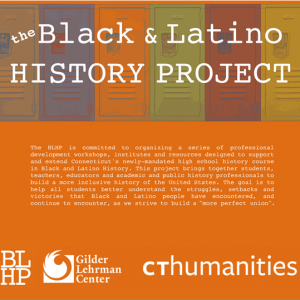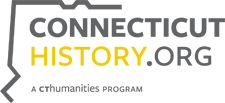For Immediate Release
July 14, 2022
Contact: Aimee Cotton Bogush | abogush@cthumanities.org | 860-937-6648
Download Release – PDF
CT Humanities Awards $317,071 to 15 Cultural Organizations for Project and Capacity Building Grants
MIDDLETOWN, CT – At their recent meeting, the board of directors of CT Humanities (CTH) awarded $317,071 in Capacity, Planning, and Implementation Grants from the CT Humanities fund.
“CT Humanities is proud to support such a robust and diverse set of projects,” says Dr. Jason Mancini, executive director at CTH. “As we emerge from the pandemic, it is clear that Connecticut’s cultural organizations are well positioned to tell our state’s stories and to inspire our residents and visitors to learn about and experience Connecticut’s best.”
Capacity Grant recipients:
Canton Public Library (Canton, $9,000) Developing a Strategic Plan for the Canton Public Library
Cultural Alliance of Fairfield County (Norwalk, $9,963) Franklin Street Works Archive Project: Preserving and Sharing a Legacy of Innovative and Sociopolitical Contemporary Art Exhibitions and Programs
Florence Griswold Museum (Old Lyme, $7,500) Creating a Visitor-Centered Museum: The Next Phase of Community Audience Research at the Florence Griswold Museum
Southington Public Library (Southington, $8,507) Strategic Planning for the Barnes Museum
Capacity Building grants support Connecticut organizations that bring the humanities to the public by helping them better understand their audiences, assets, and operations.
Kristi Sadowski, Executive Director, Southington Public Library and Barnes Museum, explains, “With a Capacity Grant provided by CT Humanities, The Barnes Museum, a historic homestead in Southington will be able to develop our first ever strategic plan. With a comprehensive collection of documents and decorative arts, the Barnes Museum showcases the history of our town. A strategic plan will allow us to grow and advance our mission in an intentional and hopefully successful way.”
Planning and Implementation Grant recipients:
Greenwich Historical Society (Cos Cob $35,000) Sports! More Than Just a Game: An Exhibition on Athletics and Sporting History in Greenwich
East Haddam Historical Society (East Haddam $25,000) East Haddam Historical Society Phase 2 Interpretive Planning Grant
Bruce Museum (Greenwich $16,066) Connecticut Modern Driving Tour
Riverfront Recapture (Hartford $25,000) Connecticut River History Galleries-Hartford Region-Joe Marfuggi Riverwalk
Litchfield Historical Society (Litchfield $35,000) To Come to a Land of Milk and Honey: Litchfield and the Connecticut Western Reserve
Gilder Lehrman Center for the Study of Slavery, Resistance, and Abolition at the MacMillan Center at Yale (New Haven $30,300) Black and Latino History Project
Lyman Allyn Art Museum (New London $35,000) Barkley L. Hendricks in New London
Mohegan Tribe (Uncasville $17,400) Flying Bird’s Diary Biopic
Connecticut Explored (West Hartford $23,555) 20 for 20: Innovation in Connecticut History
Chamberlin Mill (West Woodstock $25,000) Chamberlin Mill Inc. Planning Grant FY2022
Westport Country Playhouse (Westport $14,750) Programs for From the Mississippi Delta production in October 2022
Planning and Implementation grants support projects that help us understand and appreciate human history, culture, values, and beliefs. They allow us to analyze our complex society and to make thoughtful, reasoned decisions based on inquiry, evaluation, and empathy.
The Gilder Lehrman Center for the Study of Slavery, Resistance, and Abolition at the MacMillan Center at Yale (GLC) will use their Implementation Grant from CT Humanities to support their Black and Latino History Project (BLHP). The funding will allow the GLC to build a robust network of scholars, teachers, and students who will work together to explore three understudied areas of the history of our state and nation: Agricultural Labor in Connecticut’s Shade Tobacco Industry; the Eugenics Movement; and Mid-20th Century Black and Puerto Rican Migrations to Connecticut. Over the course of several months, a cohort of middle and high school teachers and students will work with academic experts on each of these topics to develop strategies and curricula designed to incorporate these issues into classroom teaching across Connecticut. Each thematic unit will conclude with a public event to demonstrate how integrating these topics into existing US History classes allows us to tell a more complete story of the demographic and cultural complexity of Connecticut.
Gilder Lehrman Center Associate Director Michelle Zacks notes that “the BLHP project will help teachers, students, families, and communities appreciate the long history of racial and ethnic diversity that has made Connecticut ‘tick’ as a center for industry, agriculture, technology, intellectual growth, and creativity.”
For over twenty years, the Gilder Lehrman Center has organized history workshops for teachers and students. A core part of the GLC mission is to help the community at large use historical knowledge to understand the world we live in today. “We are extremely grateful for this CTH support,” Zacks adds, “which allows us to continue our most important work: sharing scholarly resources with the world outside of Yale and academia.”
“The Mohegan Tribe is honored and thankful to Connecticut Humanities for granting the Tribe a Planning Grant for various production needs of the feature film, Flying Bird’s Diary,” according to a spokesperson.
“The film, based on the life of Fidelia Fielding aka Flying Bird (1827-1908) – the last speaker of the Mohegan language and member of the Connecticut Women’s Hall of Fame, will serve to educate people about Native American history in an entertaining way, and it will improve our national understanding of northeastern indigenous peoples.”
“The Tribe also wishes to thank Mystic Seaport and the Sons of the American Revolution for their heartfelt support of this project and the use of their historic properties for filming.”
“Connecticut Explored thanks CT Humanities for its grant support, which will help us mark our 20th anniversary with our 20 for 20 project,” says Kristen Levithan, Education Specialist, Connecticut Explored.
“Through 20 for 20: Innovation in Connecticut History, we are honoring 20 Game Changers, a diverse group of people and projects from across the state whose work has helped shape our understanding of Connecticut history. Over the next year we will highlight the work of these Game Changers through a series of public programs, podcasts, and articles in Connecticut Explored and engage them and our audiences in considering the question, ‘What is the future of Connecticut history?’ CTH’s financial assistance makes it possible to pursue this exciting line-up celebrating our past and pondering our future.”
Opportunities to apply for a grant from CT Humanities exist throughout the year. For more information on eligibility and application due dates, visit cthumanities.org/grants/.









